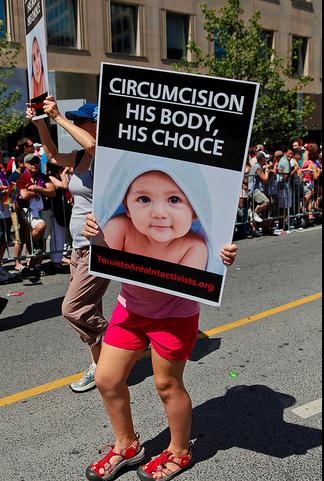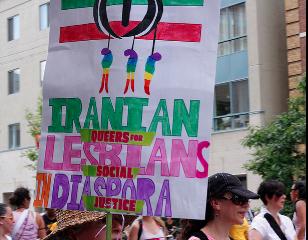
Many different organizations march in the Pride parade, including this anti-circumcision group in 2012. Credit: Xtra file photo

In 2012, a group marched in solidarity with lesbians in Iran. Credit: Xtra file photo
Funding for Toronto Pride, which begins officially June 21, has been secured for another year.
The motion to fund the 10-day event passed 32 to two in a Toronto City Council vote on June 13. Councillors Mike Del Grande and David Shiner voted against the motion.
Rob Ford was not present for the vote. “The Mayor got up and walked out during the vote on Pride’s funding,” Councillor Kristyn Wong-Tam says.
Pride Toronto’s 2013 grant was boosted to $140,000, up about $16,000 from last year. The extra money came from revenue generated by the billboard tax.
Wong-Tam says that Ford returned to his council seat in time to vote against the $7 million cultural grants package for the city’s other festivals, including the Toronto International Film Festival and Luminato. Del Grande and Shiner also voted against that package.
Ford would not say why he does not support Pride. “The most important thing is that funding is secure this year,” Wong-Tam says. “Representatives from Pride have been here for three solid days waiting for this particular vote, so I know this brings some relief.”
Wong-Tam says Councillor James Pasternak requested that debate on the city’s anti-discrimination policy be deferred to the July 16 council meeting.
Pasternak, who was absent for the vote, says the Pride parade “will be watched” closely this year, and he warns that if the Queers Against Israeli Apartheid (QuAIA) group marches, funding for WorldPride will be at risk.
“If QuAIA marches again this year, there will be stronger resolve on council,” he says. “It’s assumed that the same demonization will take place for WorldPride, so it could affect the funding for that.”
Pasternak, who won’t confirm whether he plans to march in the city council contingent this year, says QuAIA has no place in the Pride parade.
“Unfortunately, Pride’s brand is constantly being tarnished by letting QuAIA march,” he says. “I can’t figure out why they want to come under such scrutiny and waste council’s time by aligning with people who are clearly targeting people based on national and religious background.”
But Pride co-chair Francisco Alvarez says QuAIA is not the first activist group with an international cause. It’s just the most high-profile. Over the years there have been various groups that have marched in the Pride parade in protest of countless anti-gay positions that are political and religious, such as homophobia in the Vatican, Catholic school boards, fundamentalist Islam and evangelicals in Africa.
“In the past there’s been groups against policies in South Africa; this year it could be Russia,” he says. “Controversial issues will always be there.”
Pasternak says he has never heard any complaints about any other groups protesting international politics or anti-gay religions.
“It’s important that we prevent groups that are just there to disrupt, demonize and bully,” he says. “We’re worried that QuAIA plans to turn WorldPride into an international hate-fest by bringing anti-Israel protesters to the city to hijack the parade. That will be a major embarrassment.”
Alvarez says Pride will allow any group to march that is not in violation of the city’s anti-discrimination policy.
For the past two years, the city manager has determined that PT does not contravene city policy, and any further complaints should be directed to the Ontario Human Rights Tribunal.
In April, three new city staff reports determined, once again, that the use of the term “Israeli apartheid” at city-funded events is not a criminal offence and does not contravene any city policy.
QuAIA’s Tim McCaskell says that the mayor, Pasternak and Shiner are being manipulated by the “pro-Israel lobby,” who have an anti-gay agenda to attack Pride. Behind the scenes, anti-gay groups continue to lobby councillors, he says.
One email obtained by Xtra, which was sent to some councillors after the May executive committee meeting, states that the issue is of growing concern to “fundamentalist Christians.”
The email came from EthicScan, “a Toronto-based, consulting, corporate responsibility research house and educational resource centre” with a mission to “help organizations and individuals behave more ethically.”
“We can’t rely upon the outspoken Jewish Councillors, Pasternak and Shiner,” the email states. “We need to contact the large group of non-Jewish Councillors in the middle. You need to tell them this issue is important to us, and fundamentalist Christians, and other voters.”
The author of the email, David Nitkin, who is president of EthicScan, was at city council June 11, but refused to speak to Xtra. When phoned by Xtra prior to the council meeting, Nitkin confirmed he is the author but promptly hung up.
Alvarez says the pro-Israel lobby’s interest in Pride is clear. “Fundamentalist Christians are anti-gay,” he says. “So they don’t support funding for any queer event whatsoever. And I think that’s a really shaky alliance.”
McCaskell reminds that fundamentalist Christians have a reason for supporting Israel. “They believe that as soon as all the Jews return to Israel, then Armageddon happens and Jesus Christ returns . . . But [it also] serves their other interest. They want to attack Pride because they are anti-gay.”
Justine Apple, the executive director of Kulanu Toronto, a queer Jewish cultural organization, says forming an alliance with fundamentalist Christians has disturbing implications. Apple, who in previous years, as Kulanu’s spokesperson, has been vocal in her opposition to QuAIA’s participation in Pride, was quick to distance herself from the EthicScan email.
“The attitudes of fundamentalist Christians are absolutely and totally unacceptable,” says Bernie Farber, the former chief executive officer of the Canadian Jewish Congress. “I feel the same way about fundamentalist Jews. Fundamentalism is fundamentally anti-gay and should be rejected outright.”
Likewise, Apple says, Kulanu has stepped out of the Pride debate completely this year. She did not depute at executive committee or attend any meetings at city hall.
Apple says that her position on QuAIA hasn’t changed but that trying to silence the group is only giving it more attention in the media. She says Kulanu members are instead focusing on organizing their contingent to march in the 2013 parade.
“We don’t want to be sidetracked by QuAIA,” she says. “They are not worthy of our efforts. We have allowed them to become a distraction . . . We are the exact opposite of QuAIA.”
In 2012, she says, Kulanu marched behind QuAIA peacefully and without any incident. “We actually didn’t encounter any problems last year, which was good.”
McCaskell says he respects Kulanu’s decision to step out of the fight completely this year. “QuAIA is one small group in a huge parade,” he says. “You can agree with us or disagree with us.”
EthicScan Email about QuAIA by Andrea Houston

 Why you can trust Xtra
Why you can trust Xtra


